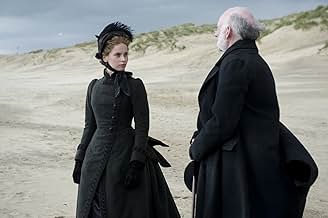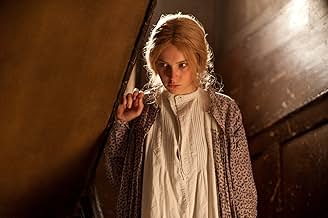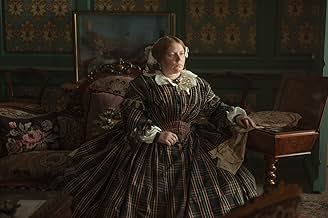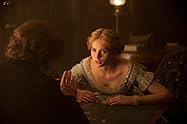ÉVALUATION IMDb
6,1/10
11 k
MA NOTE
Au sommet de sa carrière, Charles Dickens rencontre une jeune femme qui deviendra son amante secrète jusqu'à sa mort.Au sommet de sa carrière, Charles Dickens rencontre une jeune femme qui deviendra son amante secrète jusqu'à sa mort.Au sommet de sa carrière, Charles Dickens rencontre une jeune femme qui deviendra son amante secrète jusqu'à sa mort.
- Director
- Writers
- Stars
- Nommé pour 1 oscar
- 1 victoire et 7 nominations au total
Ralph Fiennes
- Charles Dickens
- (as Mr. Ralph Fiennes)
Felicity Jones
- Nelly
- (as Ms. Felicity Jones)
Kristin Scott Thomas
- Mrs. Frances Ternan
- (as Ms. Kirstin Scott Thomas)
Tom Hollander
- Wilkie Collins
- (as Mr. Tom Hollander)
John Kavanagh
- Rev. William Benham
- (as Mr. John Kavanagh)
Tom Attwood
- Mr. Lambourne
- (as Mr. Tom Atwood)
Susanna Hislop
- Mary
- (as Ms. Susanna Hislop)
Tom Burke
- Mr. George Wharton Robinson
- (as Mr. Tom Burke)
Tommy Curson-Smith
- Geoffrey
- (as Mr. Tommy Curson-Smith)
David Collings
- Governor
- (as Mr. David Collings)
Michael Marcus
- Charley Dickens
- (as Mr. Michael Marcus)
Perdita Weeks
- Maria Ternan
- (as Ms. Perdita Weeks)
Richard McCabe
- Mr. Mark Lemon
- (as Mr. Richard McCabe)
Gabriel Vick
- Mr. Berger
- (as Mr. Gabriel Vick)
Mark Dexter
- Mr. Augustus Egg
- (as Mr. Mark Dexter)
Joseph Paxton
- Mr. Pigott
- (as Mr. Joseph Paxton)
Sophie Russell
- Miss Ellen Sabine
- (as Ms. Sophie Russell)
Christos Lawton
- Mr. Evans
- (as Mr. Christos Lawton)
Avis en vedette
So much so that her husband forgets to name her when introducing his family. Charles Dickens was always fascinated by very young, slender, virginal girls, they are venerated in all his novel. His wife had been such a girl when he married her, but after giving him ten children in a period without anesthetic, she has naturally gained weight and aged. He may tell himself the classic, "my wife doesn't understand me," but it's clear he really just wants a new young, slender girl. The film itself doesn't seem to buy the story that his wife is intellectually boring but instead clearly shows Dickens flinching in disgust when he looks at his wife.
Neither are we shown any brilliance of mind in Nelly as the actress maintains a slack jawed, rabbit-like expression through most of her scenes.
Most biographies depict Dickens as not only treating his wife as invisible, but openly ridiculing her and inventing ways to be cruel to her. We see an example of that here when he makes her take his gift of jewelry to his mistress.
Why we should find this affair romantic I don't know. It's boring and trite and, worst of all, taints any future reading of his novels. A film about the life of Catherine Dickens sounds much more interesting.
Neither are we shown any brilliance of mind in Nelly as the actress maintains a slack jawed, rabbit-like expression through most of her scenes.
Most biographies depict Dickens as not only treating his wife as invisible, but openly ridiculing her and inventing ways to be cruel to her. We see an example of that here when he makes her take his gift of jewelry to his mistress.
Why we should find this affair romantic I don't know. It's boring and trite and, worst of all, taints any future reading of his novels. A film about the life of Catherine Dickens sounds much more interesting.
With The Invisible Woman being the second feature in which Ralph Fiennes tackles Charles Dickens, you may say that the thespian, already known for his love of Shakespeare, has developed a new romance with English literature.
With Fiennes at the helm, this biographical drama, based on the book by Claire Tomalin, takes a stroll into the private life of the public figure, Charles Dickens. Although The Invisible Woman positions itself at the heart of the Victorian literate, this is in fact the story of Nelly Ternan (Felicity Jones); hence the title.
The bulk of this character-piece plays out as a flashback, as the narrative oscillates between the world of Dickens and the world post-Dickens. The mysterious title refers to the young Nelly, an avid-admirer of the literary colossus, as she enters into a secret affair with her idol. She spends the best part of her youth amorously involved with the writer, but given that Dickens was a lot older, it was inevitable that she would outlive her lover.
Alone with her thoughts, Nelly, dressed in mournful black, marches along the beaches of Margate like a sleepwalker in the night, tormented by the loss of her companion; she must find a way to bring that chapter of her life to a close so that she may now move on.
The picture paints Dickens as the talented and charitable man that he was, however we are also privy to a more sinister side of the wordsmith, as we learn of his malicious actions towards his wife (played by Joanna Scanlon).
The camera takes its time, as it soaks up the brilliant performances of the cast and Abi Morgan's (Shame, The Iron Lady) masterful script provides a titillating narrative, as it transports us to the Dickensian period. Ultimately, The Invisible Woman stands as a beautifully crafted piece of filmmaking, however, it somewhat pales in comparison to Fiennes' earlier, more vigorous work. Anthony Lowery
www.moviematrix.co.uk
With Fiennes at the helm, this biographical drama, based on the book by Claire Tomalin, takes a stroll into the private life of the public figure, Charles Dickens. Although The Invisible Woman positions itself at the heart of the Victorian literate, this is in fact the story of Nelly Ternan (Felicity Jones); hence the title.
The bulk of this character-piece plays out as a flashback, as the narrative oscillates between the world of Dickens and the world post-Dickens. The mysterious title refers to the young Nelly, an avid-admirer of the literary colossus, as she enters into a secret affair with her idol. She spends the best part of her youth amorously involved with the writer, but given that Dickens was a lot older, it was inevitable that she would outlive her lover.
Alone with her thoughts, Nelly, dressed in mournful black, marches along the beaches of Margate like a sleepwalker in the night, tormented by the loss of her companion; she must find a way to bring that chapter of her life to a close so that she may now move on.
The picture paints Dickens as the talented and charitable man that he was, however we are also privy to a more sinister side of the wordsmith, as we learn of his malicious actions towards his wife (played by Joanna Scanlon).
The camera takes its time, as it soaks up the brilliant performances of the cast and Abi Morgan's (Shame, The Iron Lady) masterful script provides a titillating narrative, as it transports us to the Dickensian period. Ultimately, The Invisible Woman stands as a beautifully crafted piece of filmmaking, however, it somewhat pales in comparison to Fiennes' earlier, more vigorous work. Anthony Lowery
www.moviematrix.co.uk
If a renowned writer were to embark in an affair with a younger woman, it would make some headlines, generate some chatter but most of us will leave it at that.
That was not the case in the 1850's. When esteemed author Charles Dickens begun an affair, all sorts of efforts were put in place to stop it from becoming public. Divorce in that time, was an absolute scandal, an abomination.
So, this young, attractive, talented woman who in all certainty had a profound effect in the works of one of the most respected writers in the English language was in effect an invisible woman. Whilst she was the centre of Dickens' world, the world ought to not know her. Such were those times.
Whilst it might appear as sluggish, even flat that is not so. We get to observe the effect of the affair amongst people who had a compulsion to appear composed and reserved at all times. It is a glimpse in to a world gone by.
That was not the case in the 1850's. When esteemed author Charles Dickens begun an affair, all sorts of efforts were put in place to stop it from becoming public. Divorce in that time, was an absolute scandal, an abomination.
So, this young, attractive, talented woman who in all certainty had a profound effect in the works of one of the most respected writers in the English language was in effect an invisible woman. Whilst she was the centre of Dickens' world, the world ought to not know her. Such were those times.
Whilst it might appear as sluggish, even flat that is not so. We get to observe the effect of the affair amongst people who had a compulsion to appear composed and reserved at all times. It is a glimpse in to a world gone by.
A 6 or a 7? I went with 6, but would have preferred 6.5.
The film is beautifully made, which is no surprise, with beautiful costumes and scenery from the Victorian era, as well as being beautifully acted and well produced. However, although loosely based on the biographical book of the same name (The Invisible Woman), the plot line is vague and esoteric; that is, "intended for or likely to be understood by only a small number of people with a specialized knowledge or interest."
We see glimpses into the life and behaviors of Dickens, his mistress Ellen "Nelly" Ternan, and Dickens' wife, but the film provides little depth or detail, and certainly no explanation for the meaning of these glimpses, or even a clear time line. If you know enough about Dickens ahead of time it will make sense; if not, it will remain a mystery (such as, "what was that scene about?") unless you, as I did this morning, start learning more about Dickens' life as he lived it, including better understanding the book the film was based upon. We see otherwise unexplained glimpses into the life of Dickens and Nelly, some of which seem to be inaccurate dramatizations (poetic license?), which have little meaning on their own, and leave you wondering what just happened, and why was that important. You'll get the overall picture, but it will be like a jigsaw puzzle with many missing pieces, some of which , because of those missing pieces, are actually incorrectly put together. If you're not already familiar with the life of Dickens and Ternan, read up on Dickens before you go, or be prepared to read up on him after you see the movie. But don't otherwise expect to come up with a clear picture of anything, except that Dickens and Ternan had a long-standing affair that affected her past his death.
The film is beautifully made, which is no surprise, with beautiful costumes and scenery from the Victorian era, as well as being beautifully acted and well produced. However, although loosely based on the biographical book of the same name (The Invisible Woman), the plot line is vague and esoteric; that is, "intended for or likely to be understood by only a small number of people with a specialized knowledge or interest."
We see glimpses into the life and behaviors of Dickens, his mistress Ellen "Nelly" Ternan, and Dickens' wife, but the film provides little depth or detail, and certainly no explanation for the meaning of these glimpses, or even a clear time line. If you know enough about Dickens ahead of time it will make sense; if not, it will remain a mystery (such as, "what was that scene about?") unless you, as I did this morning, start learning more about Dickens' life as he lived it, including better understanding the book the film was based upon. We see otherwise unexplained glimpses into the life of Dickens and Nelly, some of which seem to be inaccurate dramatizations (poetic license?), which have little meaning on their own, and leave you wondering what just happened, and why was that important. You'll get the overall picture, but it will be like a jigsaw puzzle with many missing pieces, some of which , because of those missing pieces, are actually incorrectly put together. If you're not already familiar with the life of Dickens and Ternan, read up on Dickens before you go, or be prepared to read up on him after you see the movie. But don't otherwise expect to come up with a clear picture of anything, except that Dickens and Ternan had a long-standing affair that affected her past his death.
The titular Invisible Woman is Nelly Ternan, the young woman who became Charles Dickens' (1812-1870) mistress. How this liaison came about was a complete surprise to me and therefore must remain unsaid since it would IMO constitute a spoiler (most folks plow right through spoiler alerts anyway so that won't work). Nelly is played by Felicity Jones and Kristin Scott Thomas plays Nelly's mother, both who are more than competent but who have unspectacular roles.
It's all Ralph Fiennes who plays Dickens as ebullient, enthusiastic, and even flamboyant and is given a great opportunity to shine, which he does.. He also directs and was not originally set to play the lead but they couldn't find anyone else. Fiennes dominates the film so and yet the best parts for me was the work of an actress named Joanna Scanian who plays poor Mrs Dickens. Short and rotund and with an appearance of possible simple-mindedness (first impression) she rallies and practically steals the show. She is intelligent, perspicacious in how she views her husband, and is quietly courageous in an awkward scene with Nelly.
After reading the separation letter from Charles, her breakdown is severe yet restrained exhibiting an extraordinary piece of slice-of-life acting. If Charles likeability, which is considerable, is to make us forgive him for his treatment of his wife, it will have to withstand the effect of her scenes, which makes us look at him more harshly. And yet she doesn't attack him directly, it's her person that effects us (and with very little screen time). After reading a little of the history, the film seems a faithful rendering.
It's all Ralph Fiennes who plays Dickens as ebullient, enthusiastic, and even flamboyant and is given a great opportunity to shine, which he does.. He also directs and was not originally set to play the lead but they couldn't find anyone else. Fiennes dominates the film so and yet the best parts for me was the work of an actress named Joanna Scanian who plays poor Mrs Dickens. Short and rotund and with an appearance of possible simple-mindedness (first impression) she rallies and practically steals the show. She is intelligent, perspicacious in how she views her husband, and is quietly courageous in an awkward scene with Nelly.
After reading the separation letter from Charles, her breakdown is severe yet restrained exhibiting an extraordinary piece of slice-of-life acting. If Charles likeability, which is considerable, is to make us forgive him for his treatment of his wife, it will have to withstand the effect of her scenes, which makes us look at him more harshly. And yet she doesn't attack him directly, it's her person that effects us (and with very little screen time). After reading a little of the history, the film seems a faithful rendering.
Le saviez-vous
- AnecdotesRalph Fiennes and Felicity Jones appeared in Cemetery Junction (2010), in which they played father and daughter. In a 2013 interview with Jones and Fiennes on National Public Radio, Jones said that it was "weird" and "very Freudian" to go from playing one relationship to the other, but Fiennes disagreed, saying "It's just a job. Come on."
- GaffesWhen collecting cash for the hospital, there is an 1895 Crown coin on the plate. Charles Dickens died in 1870.
- Citations
Charles Dickens: A wonderful fact to reflect upon, that every human creature is a profound secret and mystery to every other.
Nelly: Until that secret is given to another to look after. And then perhaps two human creatures may know each other.
- Générique farfeluThe full cast list (in order of appearance) is presented in the style of a Dickens era theatre programme, with contemporary font and the performers' names preceded by "Mr." or "Ms."
- ConnexionsFeatured in Film '72: Episode dated 30 January 2014 (2014)
- Bandes originalesSir Roger de Coverly
(uncredited)
Traditional
[Dickens dances with Nelly]
Meilleurs choix
Connectez-vous pour évaluer et surveiller les recommandations personnalisées
- How long is The Invisible Woman?Propulsé par Alexa
Détails
- Date de sortie
- Pays d’origine
- Site officiel
- Langues
- Aussi connu sous le nom de
- The Invisible Woman
- Lieux de tournage
- sociétés de production
- Consultez plus de crédits d'entreprise sur IMDbPro
Box-office
- Brut – États-Unis et Canada
- 1 234 254 $ US
- Fin de semaine d'ouverture – États-Unis et Canada
- 31 948 $ US
- 29 déc. 2013
- Brut – à l'échelle mondiale
- 3 986 888 $ US
- Durée1 heure 51 minutes
- Couleur
- Mixage
- Rapport de forme
- 2.35 : 1
Contribuer à cette page
Suggérer une modification ou ajouter du contenu manquant

Lacune principale
By what name was La femme invisible (2013) officially released in India in Hindi?
Répondre

























